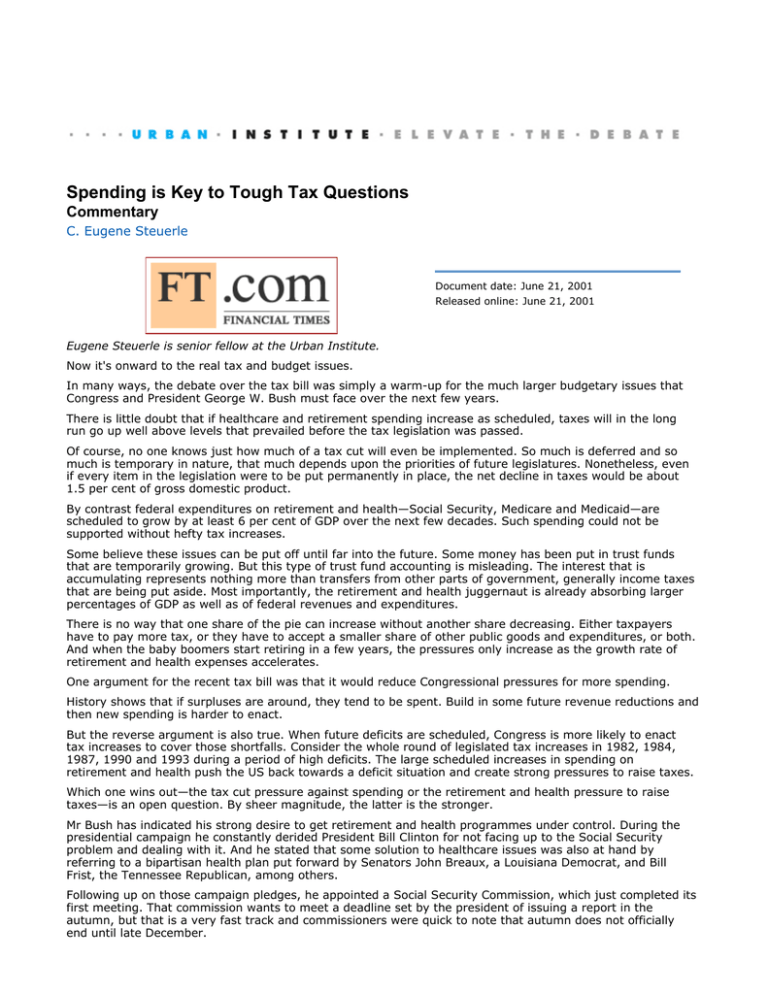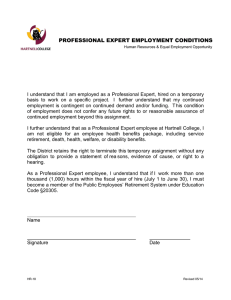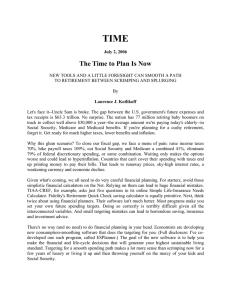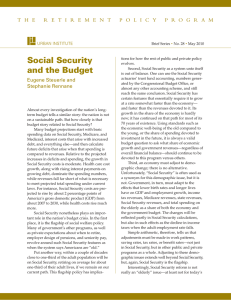Spending is Key to Tough Tax Questions Commentary C. Eugene Steuerle
advertisement

Spending is Key to Tough Tax Questions Commentary C. Eugene Steuerle Document date: June 21, 2001 Released online: June 21, 2001 Eugene Steuerle is senior fellow at the Urban Institute. Now it's onward to the real tax and budget issues. In many ways, the debate over the tax bill was simply a warm-up for the much larger budgetary issues that Congress and President George W. Bush must face over the next few years. There is little doubt that if healthcare and retirement spending increase as scheduled, taxes will in the long run go up well above levels that prevailed before the tax legislation was passed. Of course, no one knows just how much of a tax cut will even be implemented. So much is deferred and so much is temporary in nature, that much depends upon the priorities of future legislatures. Nonetheless, even if every item in the legislation were to be put permanently in place, the net decline in taxes would be about 1.5 per cent of gross domestic product. By contrast federal expenditures on retirement and health—Social Security, Medicare and Medicaid—are scheduled to grow by at least 6 per cent of GDP over the next few decades. Such spending could not be supported without hefty tax increases. Some believe these issues can be put off until far into the future. Some money has been put in trust funds that are temporarily growing. But this type of trust fund accounting is misleading. The interest that is accumulating represents nothing more than transfers from other parts of government, generally income taxes that are being put aside. Most importantly, the retirement and health juggernaut is already absorbing larger percentages of GDP as well as of federal revenues and expenditures. There is no way that one share of the pie can increase without another share decreasing. Either taxpayers have to pay more tax, or they have to accept a smaller share of other public goods and expenditures, or both. And when the baby boomers start retiring in a few years, the pressures only increase as the growth rate of retirement and health expenses accelerates. One argument for the recent tax bill was that it would reduce Congressional pressures for more spending. History shows that if surpluses are around, they tend to be spent. Build in some future revenue reductions and then new spending is harder to enact. But the reverse argument is also true. When future deficits are scheduled, Congress is more likely to enact tax increases to cover those shortfalls. Consider the whole round of legislated tax increases in 1982, 1984, 1987, 1990 and 1993 during a period of high deficits. The large scheduled increases in spending on retirement and health push the US back towards a deficit situation and create strong pressures to raise taxes. Which one wins out—the tax cut pressure against spending or the retirement and health pressure to raise taxes—is an open question. By sheer magnitude, the latter is the stronger. Mr Bush has indicated his strong desire to get retirement and health programmes under control. During the presidential campaign he constantly derided President Bill Clinton for not facing up to the Social Security problem and dealing with it. And he stated that some solution to healthcare issues was also at hand by referring to a bipartisan health plan put forward by Senators John Breaux, a Louisiana Democrat, and Bill Frist, the Tennessee Republican, among others. Following up on those campaign pledges, he appointed a Social Security Commission, which just completed its first meeting. That commission wants to meet a deadline set by the president of issuing a report in the autumn, but that is a very fast track and commissioners were quick to note that autumn does not officially end until late December. As difficult as Social Security reform may be, it is simple compared with health reform. To add to the complication, the president also promised to provide a drug benefit programme for the elderly. Congress, in response, is now engaged in a competition to see who can provide the most generous drug benefits. By itself such a bill only adds to health cost pressures. A broader reform—in which drugs are subsidised in ways similar to alternative forms of healthcare but total healthcare costs are constrained—will be much harder to advance. Whether and how the president captures control of this agenda remains to be seen. If you want to determine the long-term direction of taxes, the best place to look is not at the recent tax bill but to upcoming retirement and health reform efforts. Now we're talking real money. Other Publications by the Authors C. Eugene Steuerle Usage and reprints: Most publications may be downloaded free of charge from the web site and may be used and copies made for research, academic, policy or other non-commercial purposes. Proper attribution is required. Posting UI research papers on other websites is permitted subject to prior approval from the Urban Institute—contact publicaffairs@urban.org. If you are unable to access or print the PDF document please contact us or call the Publications Office at (202) 261-5687. Disclaimer: The nonpartisan Urban Institute publishes studies, reports, and books on timely topics worthy of public consideration. The views expressed are those of the authors and should not be attributed to the Urban Institute, its trustees, or its funders. Copyright of the written materials contained within the Urban Institute website is owned or controlled by the Urban Institute. Source: The Urban Institute, © 2012 | http://www.urban.org




